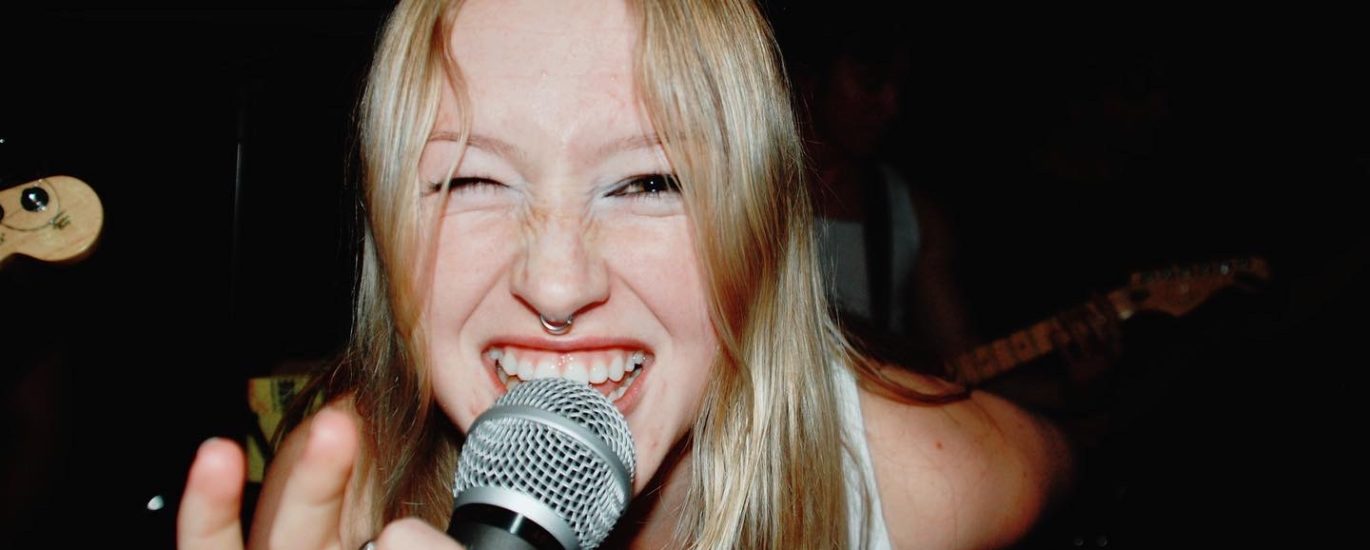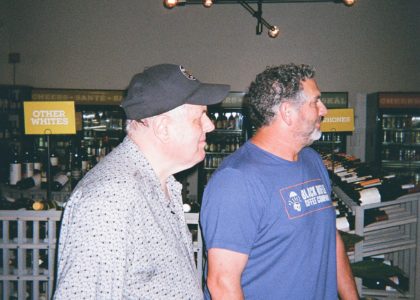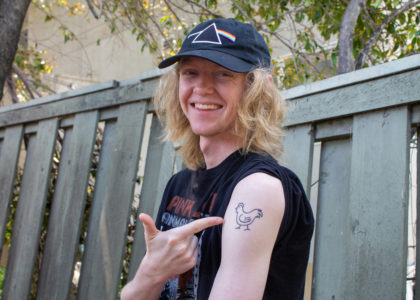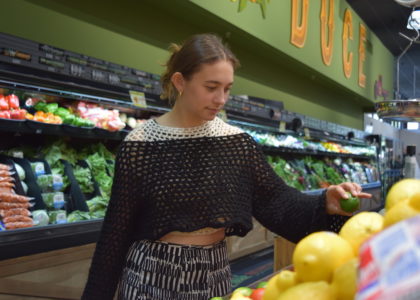By Alyson Smith
Abby Neal grew up with music, surrounded by her dad’s collection of over 500 vinyl records.
When she was a young child, she would play games of pretend with a guitar cut out of cardboard, using her family’s dining room table as a stage. Now, Neal is no longer pretending. She’s on-stage nearly every weekend as the bassist of the Sandspits, an indie surf-rock band local to San Luis Obispo.
“Younger me would love what I’m doing right now,” Neal said. “She would probably scream and run around the house [with excitement].”
Neal is a self-taught guitarist and bassist. Shortly after receiving a bass for Christmas in 2020, she met Lucas Erickson, one of the two guitarists of the Sandspits. Erickson was looking for a bassist for the band, and Neal volunteered.
She joined Erickson, drummer Jack Vitek and guitarist Nilav Maulik, and the group began practicing, performing and recording as a band.
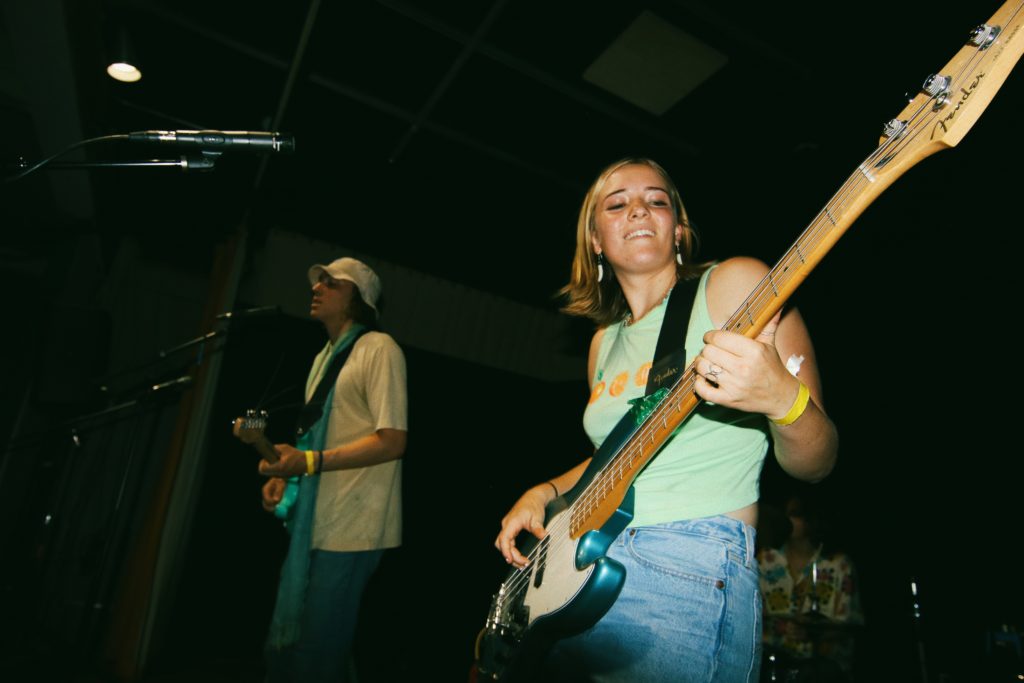
Abby Neal, electrical engineering junior, plays bass in her band, The Sandspits.
Of the four band members, Neal is the only woman — which isn’t an uncommon occurrence in San Luis Obispo’s largely male-dominated band scene.
Most of the bands that are local to San Luis Obispo are either male-dominated or consist solely of male musicians. Shabang, a music festival hosted annually at Laguna Lake Park, has hosted 87 musical acts since 2017. Less than 20% of those acts included at least one woman.
Similarly, the 2022 Concerts in the Plaza series sponsored by the Downtown SLO Association featured 10 headliners, only two of which were fronted by women.
But while men do still dominate the local music scene, local talent booker Drake Freeman said there’s been a recent increase in women getting involved — especially in student-run bands like the Sandspits.
“I would say since COVID, women have been more prevalent in the SLO music scene,” Freeman said.
Neal, who is also an electrical engineering junior at Cal Poly, is familiar with navigating male-dominated spaces.
“A lot of the time, I’m the only girl in my class, and if that’s the case, you just have to work hard and be confident in what you do,” she said. “It’s the same [in music].”
Being the only woman in the band does present its own set of challenges, Neal said. Audience members — especially men — sometimes treat Neal differently than they do her bandmates.
Neal recalled one incident in which an intoxicated man at the front of the audience repeatedly touched her while she was performing. Her bandmates eventually had to intervene.
“Sometimes people just think that they can take advantage of you… like you don’t deserve any of that respect,” Neal said. “He wouldn’t do that to a guy, obviously.”
The Sandspits speak openly about Neal being their only female member and work together to ensure Neal’s voice is not overshadowed by the male majority.
“It’s always such a great feeling to be with my band,” Neal said. “We respect each other so much.”
Neal said she also enjoys connecting with local musicians outside of her own band — like Skyllar Evans, the lead singer and only woman of local punk band Plywood Love.
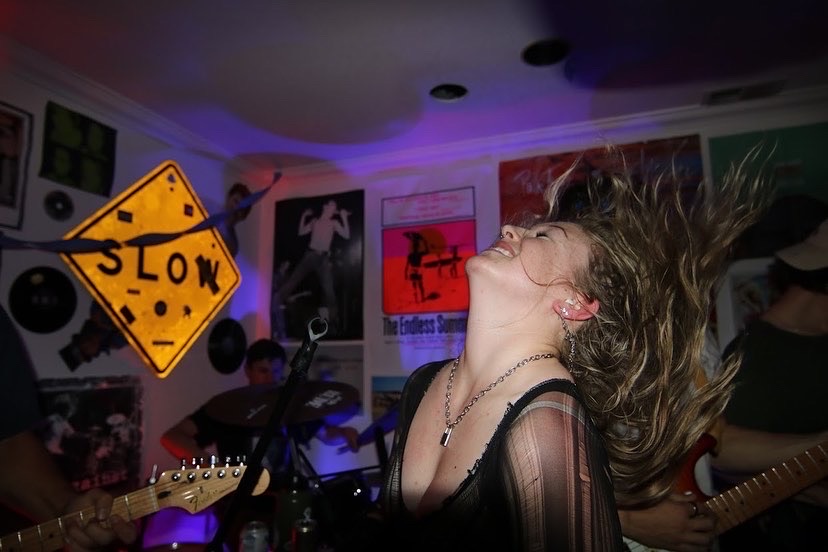
Skyllar Evans, agricultural communications senior, is the lead singer of her band, Plywood Love.
Evans, who graduated from Morro Bay High School before coming to Cal Poly, has been attending house shows in San Luis Obispo since she was 17.
She frequented Jeffrey House, a popular house show location for Cal Poly students, and quickly realized that nearly every band that performed at Jeffrey House was male-dominated.
When Plywood Love began playing shows locally, Evans made it a goal to play at Jeffrey House — and she eventually did, just one week after the Sandspits performed at the same venue.
“I remember telling Abby [Neal] that night that she was the first girl I’d ever seen play Jeffrey,” Evans said. “Then I got to do it as well a week later, and the show was so much fun.”
Evans said she views other female musicians as role models and hopes that her own involvement in the local music scene will inspire others to get involved. Performing in male-dominated spaces could give other women the confidence to follow their lead, she said.
“There isn’t a lot of female representation [in the local music scene], but I think it’s changing,” Evans said. “I’m seeing more bands pop up in SLO that are mostly female, and it makes me really happy.”
Amanda Mei (Wernik), the lead singer and guitarist of Kiwi Kannibal and a recent Cal Poly graduate, said she saw very few female musicians while growing up, which made it difficult to believe she was capable of becoming a musician herself.
“It was this unattainable fantasy, me fronting my own band,” Mei said. “I’ve always known how to play instruments, I just didn’t think there was a place for me in music.”
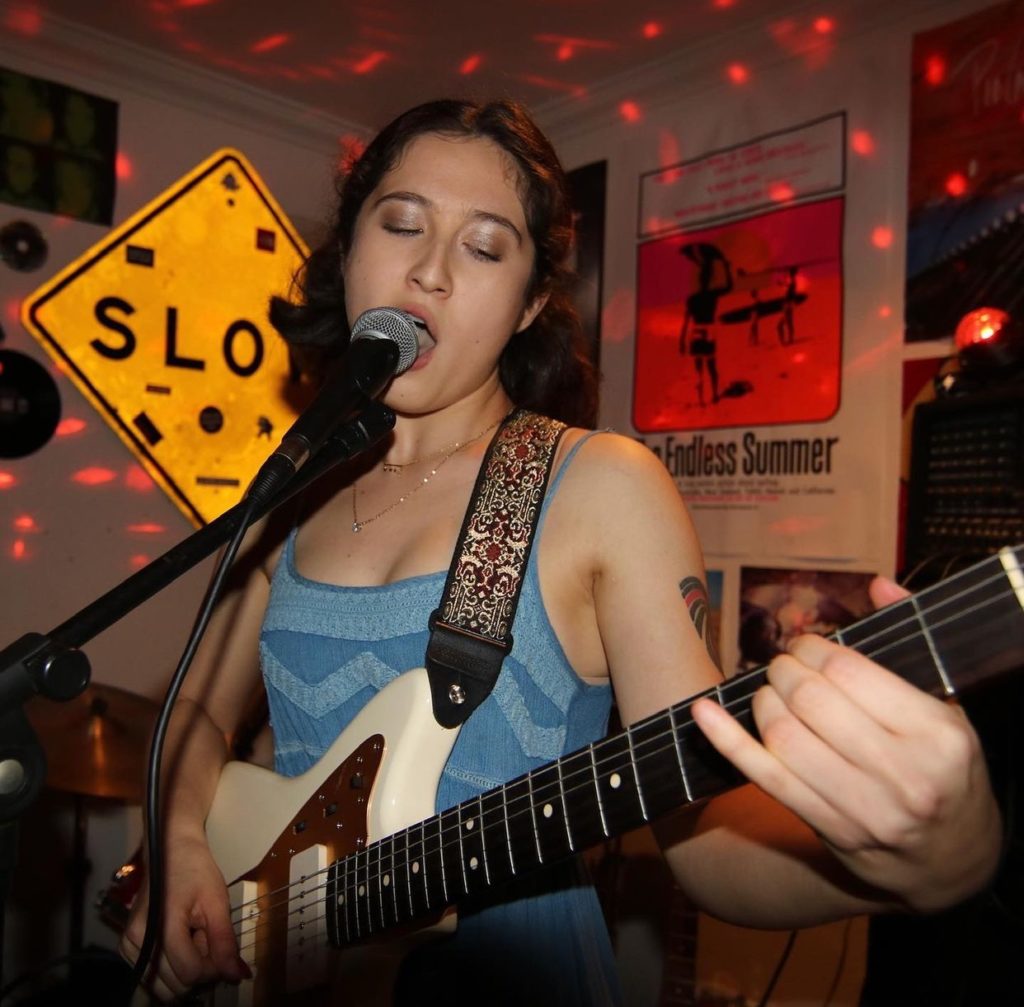
Amanda Mei, a Cal Poly journalism graduate, is the frontwoman of her band Kiwi Kannibal.
Mei is the only woman in Kiwi Kannibal. She started the band, writes their songs and coordinates the bookings of their shows — she’s the frontwoman of the band, but Mei said that it’s not uncommon for people at shows to assume she is a bandmate’s girlfriend.
“The biggest challenge I’ve dealt with is self-doubt,” Mei said. “The band, it was something that I built from the ground up, but sometimes I worry that people will assume my male bandmates did all of it.”
Mei said that in overcoming that self-doubt, she’s developed a sense of community not only with other female musicians, but also with women who attend Kiwi Kannibal shows as audience members.
“Having women come up to me after shows and say that my songs emotionally resonated with them, nothing brings me more fulfillment,” she said.
Female representation in local music is increasing beyond the band scene. Cal Poly radio station KCPR has seen a drastic increase over the past few years in both women getting involved and holding leadership positions, according to programming and music director Zoe Boyd.
Boyd joined KCPR during her freshman year in 2019. At that time, leadership positions were mostly held by men. Now, all but one leadership position at KCPR is filled by a woman.
Boyd said she actively tries to promote inclusivity at KCPR, not just among the staff, but in the voices they choose to air.
She monitors a spreadsheet where KCPR staff can recommend songs to enter into their current rotation. She began actively encouraging staff to suggest songs with female voices after noticing that male voices dominated most of the previous year’s rotations.
“I’ve really been trying to pay attention to non-male voices in particular and help uplift those artists,” Boyd said. “The KCPR motto is ‘Where different matters,’ so we put a lot of effort into creating a space that gives a voice to everyone.”


